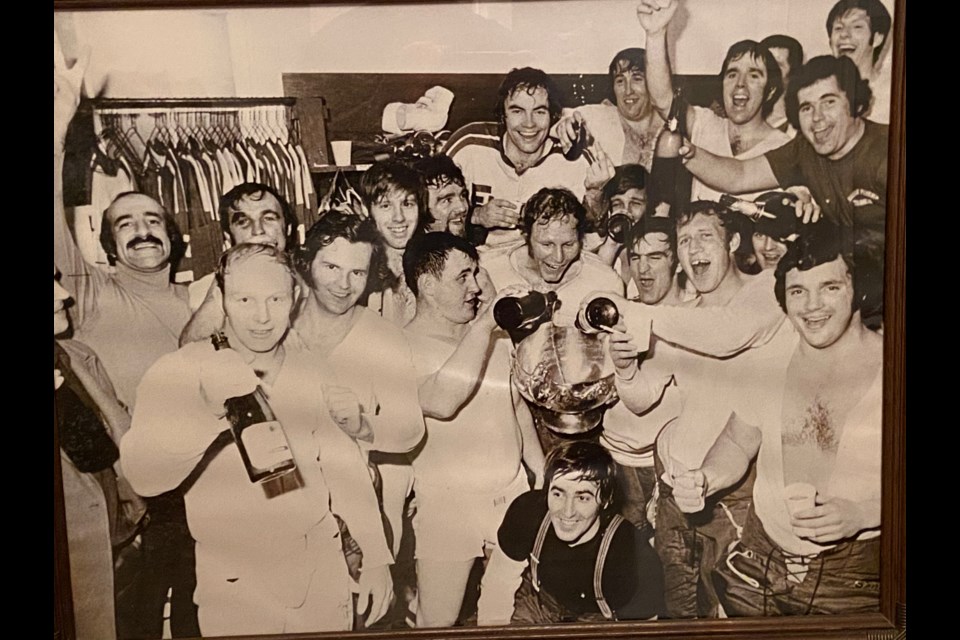Exactly 50 years ago today, the 1974 Allan Cup final series began in Cranbrook, B.C., with the Barrie Flyers taking on the host Royals.
A week later, the Flyers skated home with the title. That Allan Cup victory, behind only the junior Flyers’ two Memorial Cup crowns in 1951 and ’53 and the Colts’ Ontario Hockey League championship in 2000, remains among the best by a hockey team from Barrie.
“Without stretching the point too far,” newspaper columnist Frank Stone opined at the time, “the Flyers are probably the best hockey team outside of the National Hockey League or World Hockey Association.”
In the decisive Game 6, Bob Baird scored twice, including the eventual winner, less than five minutes after the puck was dropped. Kent Ruhnke, the Flyers’ leading scorer in the playoffs, added another goal before the first intermission as the Flyers went into cruise control the rest of the way.
It wasn’t a smooth journey to get there.
Senior hockey had come to town about a decade earlier, to fill a void when the junior Flyers left for Niagara Falls. The Flyers held sway in Barrie between the two local iterations of major junior hockey, and before the considerable presence of the Jr. B Colts of the 1980s and early 1990s.
Jim Short was the Flyers’ general manager, and its most notable player was local star Corby Adams. The team struggled at first, but with Short heading up a management group that was the envy of senior hockey, and Adams leading the way on the ice, the team began to find its mojo as the calendar flipped from the 1960s to 1970.
Darryl Sly, a Collingwood native, had won a silver medal at the 1960 Olympics around the time he was wrapping up his junior career with St. Mike’s. He then had a long run in professional hockey that included NHL stops in Toronto, Buffalo and Minnesota, as well as a Calder Cup-winning stretch in Rochester of the American Hockey League. Sly was the team’s player-coach and he added pieces that included Baird, former Toronto Marlies star Doug Acomb and another Collingwood native, Ron Robinson (who is this columnist’s father).
The Flyers won the Eastern Canada title in 1972 but fell to the Spokane Jets in the Allan Cup final that was played in the Pacific Northwest that year. A heartbreaking loss to Simcoe County rivals, the Orillia Terriers, followed in the league final in 1973. The Terriers went on to win the Allan Cup.
That loss was avenged a year later, and then the Flyers beat the Thunder Bay Twins to earn a spot in the national final as Sly’s team flew west to take on the Western International Hockey League champions in Cranbrook.
The Flyers and Royals traded wins before the roof caved in on Barrie in Game 3. Up 5-2, the Flyers surrendered seven unanswered goals to lose 9-5.
Looking back at news reports, it’s telling how little has changed in playoff hockey, even if the technology has dramatically. Long before video review and immediate coverage on social media that now tend to amplify such things, complaints about the referees were at a fever pitch. The primary sounding board was newspapers and television newscasts. Dispatches from the picturesque town in the Canadian Rockies painted an ugly picture.
Sly was beside himself with his team’s treatment at the hands of the officials, who were drawn largely from the host league.
“They are making a farce out of the Allan Cup,” bellowed Sly.
Not to be outdone, Cranbrook president Ron Hutchinson had his own complaints.
“I consider it totally unfair to the home team to have to play a series in which the officials are from the WIHL,” said Hutchinson. “It appears to me that they are watching certain players who they know through experience tend to play the game a little aggressively.”
Fifty years on, complaining about officials seemed to wax and wane with how a team fared on the scoreboard. Go figure.
In the end, and whatever the actions of the men in stripes, the Flyers were too good. They had three scoring lines, and a defence that was led by local boy Jim Thompson, Jack Smith and Steve Sly, Darryl’s younger brother. They all played in front of Ernie Miller, who was considered the best goalie below the NHL/WHL and had many top senior goalie awards on his mantle to prove it.
The pivotal Game 4 went into double overtime before Robinson scored on a set-up from Smith to win the match and tie the series.
From there, Ruhnke, who was amid a collegiate career at the University of Toronto and later had stints with the Boston Bruins and Winnipeg Jets, ran roughshod over the Royals.
The Flyers finally had their national championship. The team got close but never again won the Allan Cup.
Wider changes in the hockey world, principally the upstart WHA’s effect on the leagues below the NHL, had already started to chip away at the foundation of senior hockey. Ultimately, that led to its demise. A splashy special section in the Barrie Examiner — complete with coverage of a raucous airport crowd meeting them when the team touched down and a city hall reception — had reports speculating how the OHA was going to deal with the dark clouds on the horizon.
Looking back, the concern was justified; the Flyers’ Allan Cup win, along with the victory by the Terriers a year earlier, were the most notable before senior hockey began to slip down the wider hockey ladder.
You likely wouldn’t have known, but the 2024 Allan Cup was awarded last weekend, when the host Dundas Real McCoys defeated Southern Shore from Newfoundland 6-1 in the final.
No one is speculating that the Real McCoys were among the best teams not playing in the NHL, like was the case in Barrie a half-century ago.



